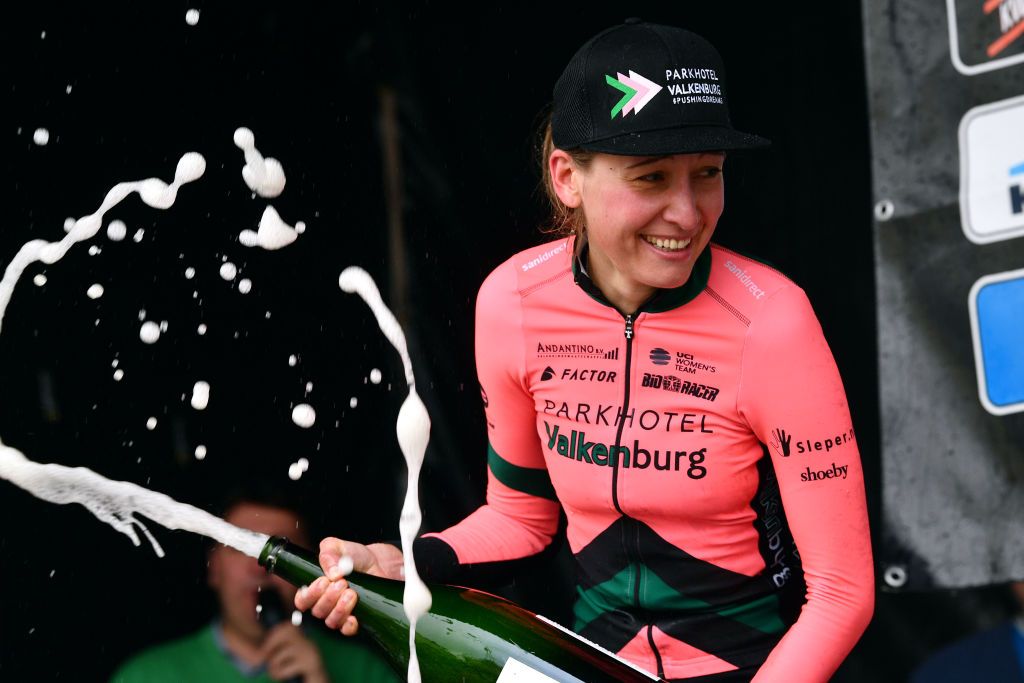Sofie De Vuyst's B-sample positive for anabolic steroids
Belgian rider to seek representation from Denise Betsema's lawyer

Sofie De Vuyst's B-sample has tested positive for exogenous anabolic steroids, according to a report in Het Laatste Nieuws on Wednesday. The Belgian rider has appealed to lawyer Johnny Maeschalck for representation to try and clear her name of any wrongdoing.
Maeschalck represented Dutch cyclo-cross racer Denise Betsema in a recent doping case that saw her receive a back-dated six-month suspension after twice testing positive for anabolic androgenic steroid last year.
Maeschalck successfully demonstrated to the UCI that Betsema had no intention of doping and that her positive tests were the result of contaminated supplements and the fault of a Belgian pharmacist.
Betsema's back-dated six-month doping ban is 'bullshit' says Compton
Denise Betsema free to race as UCI announces back-dated six-month ban
Sofie De Vuyst's contract with Mitchelton-Scott suspended pending doping investigation
Sofie De Vuyst admits failing doping control
De Vuyst requests B-sample analysis after testing positive for steroids
De Vuyst returned a positive test after an out-of-competition anti-doping control on September 18, 2019, the week prior to the UCI Road World Championships.
According to Het Laatste Nieuws, the A-sample was tested through the National Anti-doping Organisation (NADO) Flanders.
She admitted to the positive test in December, 2019, but pleaded her innocence and requested the analysis of the B-sample, which was tested at the DoCoLab Ghent, according to Het Laatste Nieuws.
Her team, Parkhotel Valkenburg, immediately suspended her.
The latest race content, interviews, features, reviews and expert buying guides, direct to your inbox!
Last year, De Vuyst won Brabantse Pijl and had been awarded the Flandrienne of the year prize for her 2019 road season.
She had signed a contract to race with Mitchelton-Scott in 2020, however, the WorldTeam announced that they suspended her contract pending the results of an ongoing investigation surrounding her positive test.
Betsema's case raised the ire of several of her fellow cyclo-cross competitors and other outspoken riders, with Katie Compton calling the off-season ban "bullshit".
However, the defense strategy taken is similar to one used by Daryl Impey, who argued that his probenecid positive in 2014 was the result of cross-contamination of the capsules a pharmacist filled for him with bicarbonate soda.
Impey was cleared to race without being handed a formal ban as probenecid, a diuretic, is a specified substance under the WADA code.
Androgenic steroids are not specified substances and any amount of the drug in a riders' sample is considered an anti-doping rule violation, but UCI rules allow for bans lower than the minimum of four years in cases of 'unintentional' anti-doping rule violations.
Cyclingnews is the world's leader in English-language coverage of professional cycling. Started in 1995 by University of Newcastle professor Bill Mitchell, the site was one of the first to provide breaking news and results over the internet in English. The site was purchased by Knapp Communications in 1999, and owner Gerard Knapp built it into the definitive voice of pro cycling. Since then, major publishing house Future PLC has owned the site and expanded it to include top features, news, results, photos and tech reporting. The site continues to be the most comprehensive and authoritative English voice in professional cycling.